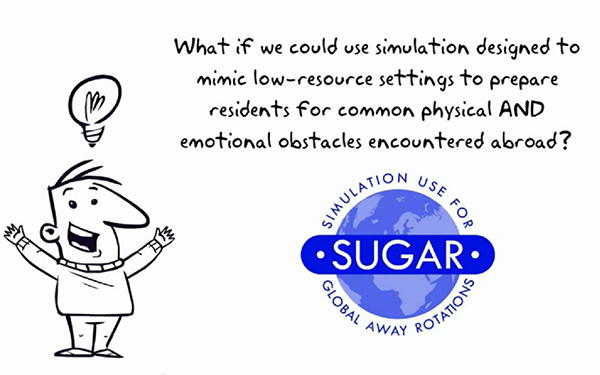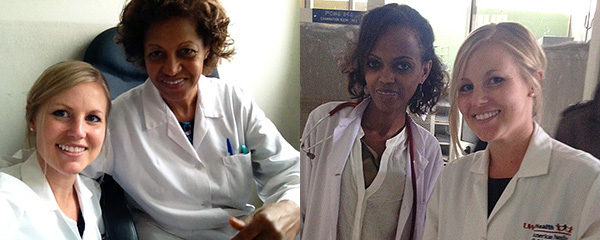When Department of Pediatrics Chief Resident Halie Anderson, MD, traveled to Ethiopia last year for a global health rotation, she encountered the challenges of caring for patients in a developing country: unfamiliar diseases, limited physical resources and health-system differences.
In addition, she, like most residents, faced the feelings of frustration, anxiety, and helplessness that can accompany such an experience.
Fortunately, a global health simulation curriculum co-developed by Assistant Professor Sabrina Butteris, MD, and the University of Minnesota’s Michael Pitt, MD, helped her prepare for those challenges, provide better patient care, and make the most of her time abroad.

‘Profoundly’ Realistic
The curriculum, Simulation Use for Global Away Rotations (SUGAR), consists of eight simulated cases that mimic patient care in resource-limited settings.
Each case is designed to elicit emotions of frustration, floundering, failure and futility (“the four Fs”), and then teach residents how to transform those emotions into adaptability, awareness, adjustment, and acknowledgment (the “four As”).
“Preparing residents for the emotional challenges they will inevitably encounter when caring for children in resource-limited settings is absolutely critical to their success and well-being,” Dr. Butteris explained. “It’s also important for colleagues abroad and their patients, because a poorly prepared resident may react to these situations in a way that directly impacts those around them.”
“It’s imperative that we give residents the opportunity to debrief these experiences in a controlled environment, rather than sending them off to experience the emotions for the first time thousands of miles from home,” she continued.
Dr. Anderson participated in the SUGAR curriculum throughout all three years of her residency, as part of the department’s global health track.
“The simulations get at the emotional aspects of how you’re going to feel when you don’t have the resources you’re used to having,” Dr. Anderson reflected. “They also allow you to think about [medical issues] we don’t commonly see here in Wisconsin. It’s profound how realistic they make it.”
Adaptability for Difficult Situations
In March 2014, Dr. Anderson spent five weeks in the pediatric emergency department at Tikur Anbessa (Black Lion) Specialized Hospital in Addis Ababa, Ethiopia.
There, she cared for children with a broad range of conditions, including, but not limited to: acute infections, trauma, congenital heart problems, malnutrition, chronic diseases and cancer.
She recalled a particularly challenging case: a code situation that she participated in, but because the equipment needed for resuscitation was not available, the child died.
The simulation training gave her tools to help process her feelings. “No matter how much you simulate it, you’re still going to have the emotional experience, and it’s going to be hard,” she explained. “But I was able to identify the emotions, particularly the frustration and helplessness, more easily and reflect on them instead of getting more upset. It makes you more adaptable when you have those skills.”

A Pilot Study and National Rollout
Dr. Anderson’s positive experience with the SUGAR curriculum mirrors that of other residents around the nation.
In a pilot study published in Academic Pediatrics (Butteris SM, Gladding SP, Eppich W, Hagen SA, Pitt MB, Investigators S. Simulation Use for Global Away Rotations (SUGAR): Preparing Residents for Emotional Challenges Abroad-A Multicenter Study. Academic Pediatrics 2014; 14(5): 533-41), Dr. Butteris and colleagues at seven initial partner institutions found that residents rated the SUGAR experience as useful or very useful (4.5 on a scale of 5) for global health preparation.
In addition, 94% of residents said the experience would change the way they would prepare before going abroad.
The SUGAR curriculum was rolled out nationwide in 2014, and is now being used at dozens of residency programs in pediatrics, emergency medicine, family medicine, obstetrics, and disaster medicine.